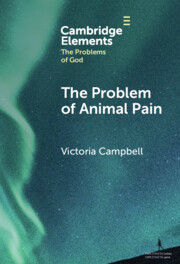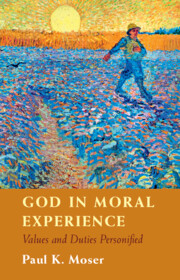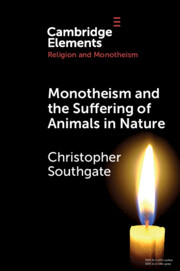51 results
The deal at the dawn of time
-
- Journal:
- Religious Studies , First View
- Published online by Cambridge University Press:
- 17 March 2025, pp. 1-16
-
- Article
-
- You have access
- Open access
- HTML
- Export citation
The Contribution of Eric Mascall to Theodicy and (Possibly) Providence
-
- Journal:
- Journal of Anglican Studies / Volume 22 / Issue 2 / November 2024
- Published online by Cambridge University Press:
- 13 January 2025, pp. 558-572
-
- Article
-
- You have access
- Open access
- HTML
- Export citation
Chapter 8 - The Voice of Complaint
-
-
- Book:
- The Cambridge Companion to Romanticism and Race
- Published online:
- 21 November 2024
- Print publication:
- 28 November 2024, pp 130-149
-
- Chapter
- Export citation
In defence of Rebel Angel Theodicy
-
- Journal:
- Religious Studies , First View
- Published online by Cambridge University Press:
- 13 November 2024, pp. 1-14
-
- Article
-
- You have access
- Open access
- HTML
- Export citation
Chapter 34 - Afterlives 1: The Victorian Vicar
- from Part IV - Critical Fortunes and Afterlives
-
-
- Book:
- Oliver Goldsmith in Context
- Published online:
- 28 November 2024
- Print publication:
- 07 November 2024, pp 289-297
-
- Chapter
- Export citation
Non-ideal theory in the philosophy of religion: Exploring implications of non-ideal theorising for the problem of evil
-
- Journal:
- Religious Studies , First View
- Published online by Cambridge University Press:
- 06 November 2024, pp. 1-16
-
- Article
-
- You have access
- Open access
- HTML
- Export citation
God, Evil, and Anthropomorphism
-
- Journal:
- New Blackfriars / Volume 105 / Issue 6 / November 2024
- Published online by Cambridge University Press:
- 16 October 2024, pp. 582-593
- Print publication:
- November 2024
-
- Article
-
- You have access
- Open access
- HTML
- Export citation
Chapter 9 - A Perfect Planet
- from Part III - Transfiguration and Global Perfection
-
- Book:
- Human Perfection, Transfiguration and Christian Ethics
- Published online:
- 09 May 2024
- Print publication:
- 16 May 2024, pp 195-221
-
- Chapter
- Export citation
A Joban Theology of Consolation
-
- Journal:
- Harvard Theological Review / Volume 117 / Issue 2 / April 2024
- Published online by Cambridge University Press:
- 15 May 2024, pp. 181-203
- Print publication:
- April 2024
-
- Article
-
- You have access
- Open access
- HTML
- Export citation
The theological sources and poetic priorities of Milton's narrative theodicy
-
- Journal:
- Scottish Journal of Theology / Volume 77 / Issue 3 / August 2024
- Published online by Cambridge University Press:
- 06 March 2024, pp. 274-290
- Print publication:
- August 2024
-
- Article
-
- You have access
- Open access
- HTML
- Export citation
A New Response to the Problem of Natural Evil
-
- Journal:
- New Blackfriars / Volume 105 / Issue 3 / May 2024
- Published online by Cambridge University Press:
- 08 February 2024, pp. 281-293
- Print publication:
- May 2024
-
- Article
-
- You have access
- HTML
- Export citation
Evil and embodiment: towards a Latter-day Saint non-identity theodicy
-
- Journal:
- Religious Studies / Volume 61 / Issue 1 / March 2025
- Published online by Cambridge University Press:
- 17 January 2024, pp. 93-105
- Print publication:
- March 2025
-
- Article
-
- You have access
- HTML
- Export citation

The Problem of Animal Pain
-
- Published online:
- 15 January 2024
- Print publication:
- 01 February 2024
-
- Element
-
- You have access
- Open access
- HTML
- Export citation
God and the Problem of Evil: Why Soul-Making Won't Suffice
-
- Article
-
- You have access
- Open access
- HTML
- Export citation
What doesn't kill me makes me stronger? Post-traumatic growth and the problem of suffering
-
- Journal:
- Religious Studies / Volume 60 / Issue 3 / September 2024
- Published online by Cambridge University Press:
- 12 December 2023, pp. 428-444
- Print publication:
- September 2024
-
- Article
-
- You have access
- HTML
- Export citation
Chapter 11 - The Problem of Evil in Either/Or
-
-
- Book:
- Kierkegaard's <i>Either/Or</i>
- Published online:
- 16 November 2023
- Print publication:
- 30 November 2023, pp 188-203
-
- Chapter
- Export citation

God in Moral Experience
- Values and Duties Personified
-
- Published online:
- 09 November 2023
- Print publication:
- 23 November 2023
Psychic immunity and uncomprehended pain: what Maimonides can tell us about the problem of suffering
-
- Journal:
- Religious Studies / Volume 59 / Issue S1 / December 2023
- Published online by Cambridge University Press:
- 23 October 2023, pp. S17-S34
- Print publication:
- December 2023
-
- Article
-
- You have access
- Open access
- HTML
- Export citation
Schelling and the problem of evil
-
- Journal:
- Religious Studies / Volume 61 / Issue 1 / March 2025
- Published online by Cambridge University Press:
- 10 October 2023, pp. 1-15
- Print publication:
- March 2025
-
- Article
- Export citation

Monotheism and the Suffering of Animals in Nature
-
- Published online:
- 23 June 2023
- Print publication:
- 06 July 2023
-
- Element
- Export citation

